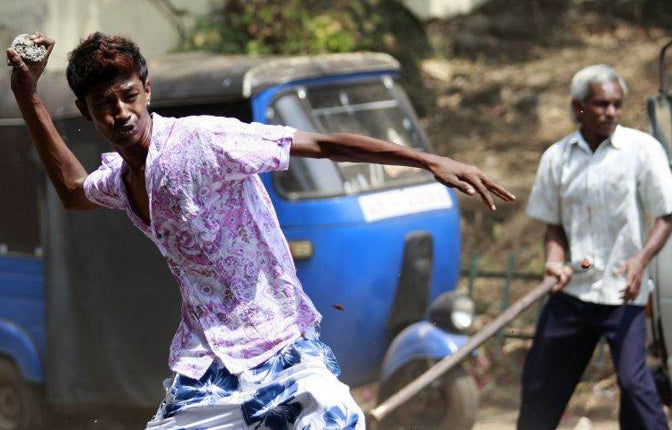Sri Lanka police fire tear gas on opposition in bid to quell protests
Pro-government activists throw stones at Fonseka demonstrators outside court

Your support helps us to tell the story
From reproductive rights to climate change to Big Tech, The Independent is on the ground when the story is developing. Whether it's investigating the financials of Elon Musk's pro-Trump PAC or producing our latest documentary, 'The A Word', which shines a light on the American women fighting for reproductive rights, we know how important it is to parse out the facts from the messaging.
At such a critical moment in US history, we need reporters on the ground. Your donation allows us to keep sending journalists to speak to both sides of the story.
The Independent is trusted by Americans across the entire political spectrum. And unlike many other quality news outlets, we choose not to lock Americans out of our reporting and analysis with paywalls. We believe quality journalism should be available to everyone, paid for by those who can afford it.
Your support makes all the difference.Supporters of the detained Sri Lankan opposition leader Sarath Fonseka were pelted with stones and fired on with tear gas yesterday after they clashed with government activists at the country's Supreme Court.
Thousands of opposition supporters angered by the arrest of their leader gathered outside the court in Colombo, where they burned life-size posters of President Mahinda Rajapaksa – the man who defeated the former general in last month's presidential election. They also smashed coconuts, following a local tradition that this would inspire divine intervention. But instead their actions were met by supporters of the government, who threw stones and chased them away. When the opposition activists fought back, said witnesses, the police intervened with tear gas. At least eight people were hurt, reported officials at local hospitals.
"We were walking peacefully when we were attacked by government goons," Marina Abdeen, an opposition supporter, told the Associated Press.
The opposition activists held the rally after General Fonseka, the 59-year-old former army chief, was detained by military police, who arrived en masse at his offices on Monday evening. The government has said he is being investigated for actions he took while still in uniform that could amount to conspiracy against the government.
It is likely the man whose public profile soared after he oversaw the defeat of Tamil separatist rebels last year will face a court martial. The members of the opposition coalition said that yesterday's demonstration would be the first of a series across the country that would rally people against both the general's arrest and what many believe is an increasingly authoritarian stance being adopted by the government.
Yet the authorities have yet to produce any evidence against General Fonseka and various officials have made differing, sometimes contradictory allegations about his alleged crime. Some have suggested the former general was planning a military coup, while others have suggested his offence was to make contact with political parties while still a serving officer, something allegedly contrary to military rules.
The former four-star general had also indicated that he was willing to participate in a war crimes investigation into the final days of the war against the Liberation Tigers of Tamil Eelam, when the UN estimates that up to 10,000 Tamil civilians were killed. That undertaking, claimed the government, was proof that Mr Fonseka "was hell-bent on betraying the gallant armed forces of Sri Lanka who saved the nation from the most ruthless terrorist group in the world".
In the aftermath of the former general's arrest and detention at the naval headquarters, the coalition of political allies that backed him as their presidential candidate have been rushing to regroup ahead of another, imminent political showdown.
On Tuesday, Mr Rajapaksa dissolved parliament and called an election for 8 April, an event in which Mr Fonseka had vowed to participate, either as a candidate for one of the established parties or one he intended to form. It seems all but impossible that he could now take part, except as a symbolic rallying point for those opposed to the government.
Join our commenting forum
Join thought-provoking conversations, follow other Independent readers and see their replies
Comments